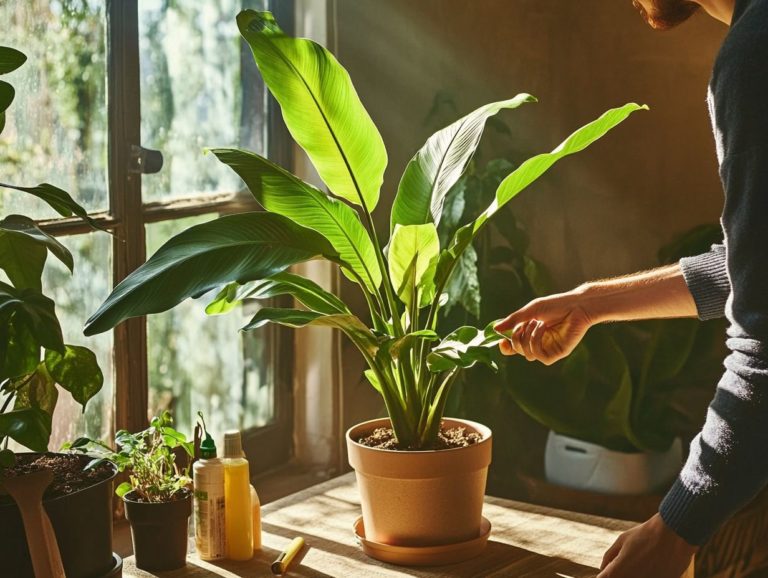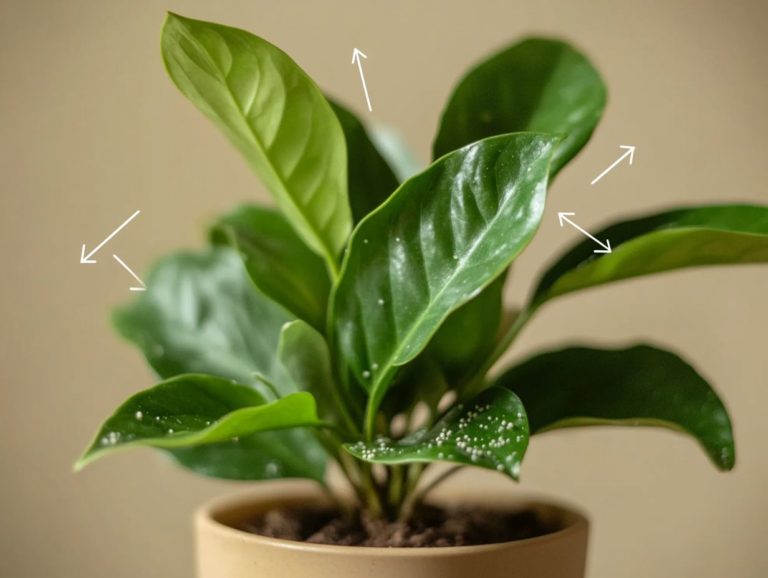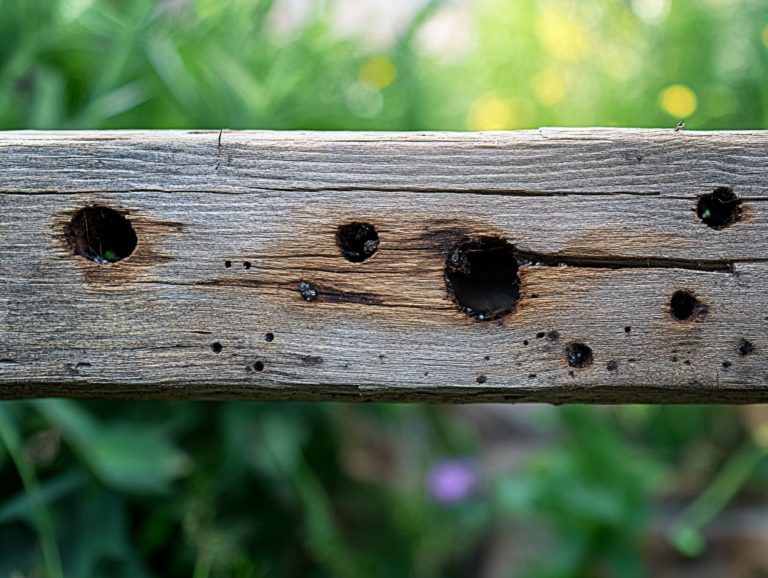5 Effective Homemade Insect Sprays
Are pests invading your home? Don t worry! There are simple, homemade solutions that are safe for your family and pets!
Dealing with those pesky household pests can certainly be a challenge, but there s no need to resort to harsh chemicals to reclaim your space.
Consider exploring five effective homemade insect sprays crafted from natural ingredients. From aromatic garlic and refreshing mint to neem oil and soapy water that targets bugs, these DIY solutions are not only eco-friendly but also easy to whip up in your kitchen.
Uncover the benefits of using these sprays, learn about the common pests they can target, and pick up some tips for safe and effective application.
With these strategies, you can say goodbye to unwanted visitors while ensuring your home remains a safe haven for both children and pets!
Contents
- Key Takeaways:
- 1. Garlic and Mint Spray
- 2. Neem Oil and Soap Spray
- 3. Citrus Peel and Cayenne Pepper Spray
- 4. Onion and Pepper Spray
- 5. Essential Oil and Vinegar Spray
- What Are the Benefits of Using Homemade Insect Sprays?
- What Are the Most Common Household Pests That Can Be Controlled with These Sprays?
- How Do These Homemade Sprays Work?
- What Are the Key Ingredients to Look for in an Effective Homemade Insect Spray?
- Are These Sprays Safe for Use Around Children and Pets?
- How Can One Make Sure the Spray Is Effective and Doesn’t Harm Plants?
- Frequently Asked Questions
- What are the benefits of using 5 effective homemade insect sprays?
- What ingredients are commonly used in homemade insect sprays?
- How do I make a basic homemade insect spray?
- Are homemade insect sprays safe for pets and children?
- Can I use homemade insect sprays on any type of insect?
- How often should I use homemade insect sprays?
Key Takeaways:

- Homemade insect sprays are a natural and cost-effective way to control common household pests.
- Garlic and mint, neem oil and soapy water, and citrus peel and cayenne pepper are some effective ingredients for DIY sprays.
- When using homemade sprays, it is important to consider safety around children and pets while ensuring effectiveness and plant-friendliness.
1. Garlic and Mint Spray
Garlic and mint spray is your go-to homemade insect repellent. It expertly harnesses the natural powers of garlic and mint to keep pests like aphids at bay.
This solution nurtures a healthy ecosystem for your garden plants. To whip up this eco-friendly solution, gather about two cups of water, a handful of fresh garlic cloves, and some mint leaves.
Begin by crushing the garlic cloves to unlock their potent oils and flavors. Then, toss the crushed garlic and mint leaves into a blender with the water, blending until you achieve a smooth consistency.
Allow this mixture to sit for at least 12 hours, letting the flavors meld beautifully before straining it into a spray bottle.
This natural pesticide is a shining star in your pest control toolkit. It effectively wards off not only aphids but also mites and whiteflies.
This versatile choice is perfect for organic gardening enthusiasts like you who are committed to sustainable solutions.
2. Neem Oil and Soap Spray
Neem oil and soapy water is an exceptional solution that blends neem oil with soapy water. This combination makes it the go-to choice for organic pest control.
It preserves the safety of beneficial insects in your garden by effectively defending against many troublesome pests, including aphids, spider mites, and whiteflies.
Neem oil acts as a natural repellent, disrupting hormone functions in insects and preventing their maturation. Soapy water suffocates soft-bodied pests while protecting friendly species that pollinate your plants.
For optimal results, apply this mixture during the cooler parts of the day. Ensure you thoroughly coat the affected areas while avoiding direct sunlight.
This potent yet gentle blend offers a reliable means to protect your plants without introducing harmful chemicals into your gardening space.
3. Citrus Peel and Cayenne Pepper Spray
Citrus peel and cayenne pepper spray merges the invigorating essence of citrus with the fiery kick of cayenne pepper. This crafts a robust homemade bug spray that effectively repels a variety of garden pests while being eco-friendly.
This powerful blend serves as an effective organic solution. It gives you the power to take charge of your pest management strategies.
By leveraging the natural properties of citrus, celebrated for its high acidity and appealing fragrance, this spray specifically targets those annoying aphids and pesky mosquitoes.
Meanwhile, the cayenne pepper injects a spicy punch that keeps crawling insects like ants and spiders at bay.
Crafting this spray is refreshingly simple:
- Combine dried or fresh citrus peels with cayenne in water.
- Let it steep before straining and transferring it to a spray bottle.
This recipe not only sidesteps the harsh chemicals typically found in commercial alternatives but also provides an economical and safe route to maintaining a thriving garden. Ultimately, it fosters a healthier environment.
Try these sprays today and say goodbye to pests. Share your success with us!
4. Onion and Pepper Spray
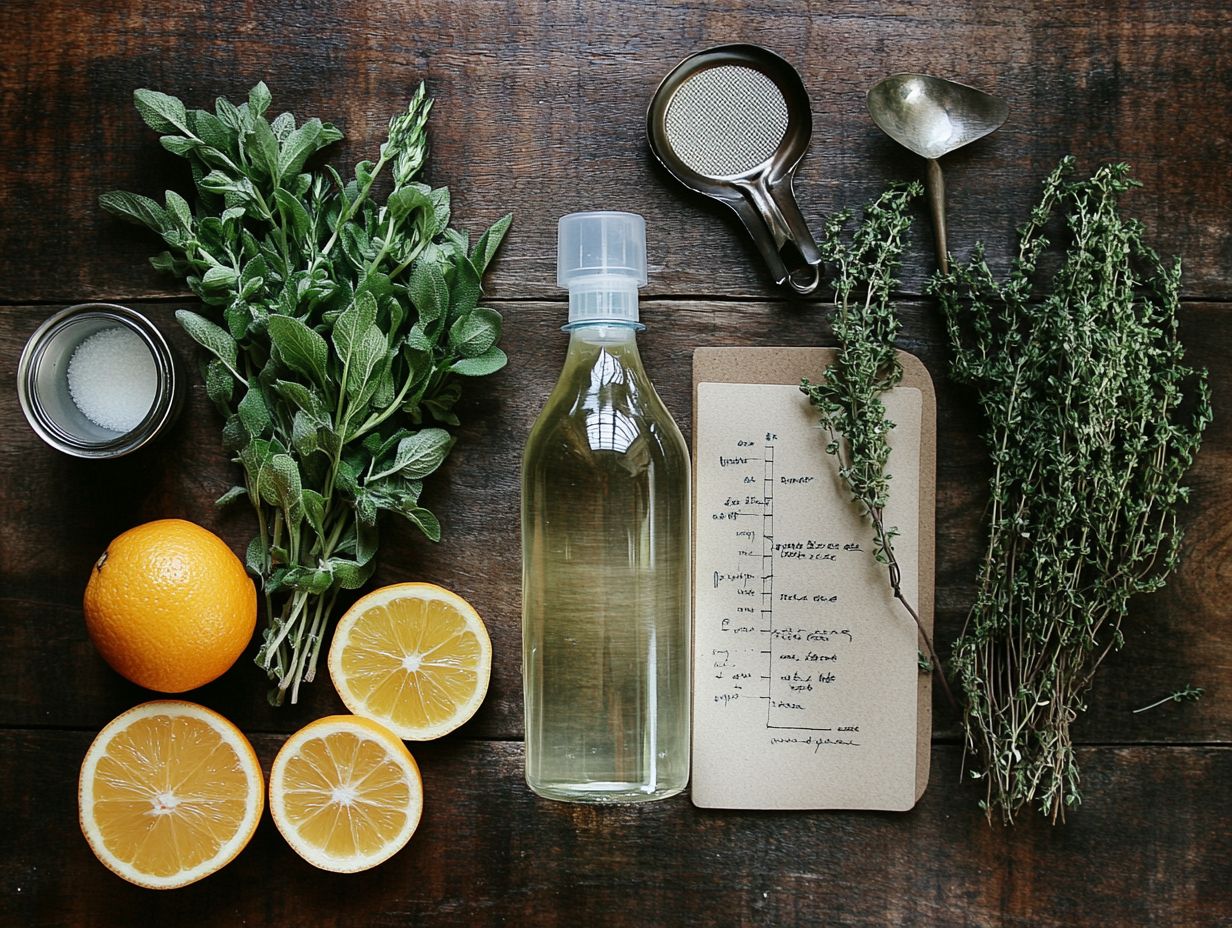
Onion and pepper spray is a remarkably effective homemade insect repellent that harnesses the pungent aroma of onions paired with the fiery kick of hot peppers, which creates a strong barrier against common garden pests.
To whip up this powerful solution, take two medium-sized onions and two hot peppers jalape os or habaneros work beautifully. Blend them together with about a quart of water until smooth, then strain the mixture to eliminate any solid bits.
This natural pesticide not only targets pesky aphids and spider mites but also reduces reliance on harmful chemicals, fostering a healthier ecosystem. Choosing this option protects beneficial insects like bees and ladybugs while keeping your plants safe from unwelcome visitors.
Embracing this eco-friendly method encourages gardening methods that are good for the environment that benefit both your garden and the planet.
5. Essential Oil and Vinegar Spray
An essential oil and vinegar spray is your go-to homemade solution, seamlessly merging the strong insect-repelling abilities of essential oils with the natural acidity of vinegar. This combination ensures effective pest control while sidestepping harmful chemicals.
This easy mix takes advantage of the great properties of essential oils like peppermint, which not only offers a refreshing aroma but also sends ants, spiders, and other unwelcome insects packing. Lavender oil serves as another formidable ally; its calming scent is a bonus while it effectively repels moths and mosquitoes.
Don t forget tea tree oil, which brings its antiseptic properties to the table, battling mildew and other garden nuisances. The vinegar works as a powerful enhancer, amplifying the oils effectiveness and balancing pH levels to create an environment that pests find less inviting.
To whip up this spray, mix one cup of water, half a cup of vinegar, and 10-15 drops of your favorite essential oils in a spray bottle. Give it a good shake before each use and apply it directly to affected plants. You ll deter pests while keeping your garden lush and thriving.
What Are the Benefits of Using Homemade Insect Sprays?
Using homemade insect sprays presents numerous advantages, including effective pest control through natural ingredients that prioritize a healthy ecosystem and protect beneficial insects. This makes them a sustainable alternative to chemical pesticides.
By choosing these eco-friendly solutions, you can significantly reduce the risk of harmful chemicals that can pollute local water sources and disrupt wildlife habitats. Homemade sprays are generally safer for children and pets, ensuring your quest for a pest-free environment doesn t compromise household safety.
These DIY alternatives are also cost-effective compared to commercial products, offering you a satisfying sense of accomplishment. You have the power to take control of your pest issues while encouraging beneficial insects like ladybugs, which play a natural role in pest management.
What Are the Most Common Household Pests That Can Be Controlled with These Sprays?
Common household pests like aphids and mosquitoes can be effectively managed with homemade insect sprays, offering a natural solution that s gentle on the environment.
These sprays often utilize everyday ingredients such as garlic, essential oils, and dish soap, each with unique properties that repel or neutralize unwelcome critters. For example, garlic is packed with sulfur compounds that send aphids and other soft-bodied pests packing, while essential oils like peppermint and citronella have earned their stripes as reliable mosquito deterrents.
Consider the case of a homeowner who whipped up a simple garlic and water mixture, managing to cut down their aphid infestation within just a week, while their neighbors struggled with ineffective store-bought chemicals. Such stories highlight that these homemade remedies can be not only effective but also eco-friendly, making them a compelling option for anyone looking to take control of pest problems.
Try making these sprays today and see the difference in your garden!
How Do These Homemade Sprays Work?

Homemade insect sprays harness the power of natural ingredients that release specific scents or compounds. These sprays effectively keep pests at bay while ensuring minimal disruption to the surrounding environment and beneficial insects.
Take garlic, for example. It contains allicin, a potent compound that lends its distinct aroma. This compound disrupts the sensory receptors of many insects, making it challenging for them to locate food or mates.
Then there’s neem oil, which serves as another layer of defense by interfering with the hormonal systems of pests. This interference prevents pests from maturing or reproducing effectively.
Vinegar, with its acidic nature, also plays a crucial role by altering the pH levels that insects thrive in.
Mixing these natural elements into homemade bug sprays creates an effective pest control method. This approach uses fewer chemicals and supports a healthy ecosystem.
What Are the Key Ingredients to Look for in an Effective Homemade Insect Spray?
Key ingredients in crafting effective homemade insect sprays include natural substances that fight pests like neem oil, essential oils, and everyday kitchen staples such as garlic and vinegar. These components work in harmony to repel pests.
These ingredients establish a formidable barrier against unwanted insects while fostering a healthier environment free from harsh chemicals. Neem oil boasts compounds that disrupt the way pests grow and reproduce, making it a powerful deterrent. Essential oils like peppermint and eucalyptus create an aromatic shield that pests find uninviting.
Garlic, famous for its strong odor, acts as a natural repellent, while vinegar’s acidity disrupts the pH levels that certain insects thrive in. To ensure maximum effectiveness, using high-quality ingredients is essential to preserve the potency of each component.
You can even experiment with variations like adding cinnamon spray or hot pepper spray to tailor your spray for specific pest issues, including problems with aphids.
Are These Sprays Safe for Use Around Children and Pets?
The safety of homemade insect sprays makes them an excellent choice for households with children and pets. These sprays rely on natural ingredients that minimize harmful effects compared to commercial pesticides found at Walmart or Amazon.
These DIY solutions often include everyday items like vinegar, essential oils, and dish soap. They provide effective insect-repelling properties and significantly reduce the risk of toxic exposure, making them ideal for managing pests naturally. For more information, check out the top 5 natural remedies for houseplant pests.
You might understandably worry about your little ones or furry friends coming into contact with these mixtures. However, by following simple safety measures like keeping the sprays out of reach, using them in well-ventilated areas, and testing small patches to check for allergic reactions you ll gain peace of mind quickly and effortlessly!
By choosing these homemade alternatives, you can create a safer environment while effectively tackling insect problems.
How Can One Make Sure the Spray Is Effective and Doesn’t Harm Plants?
To ensure your homemade insect sprays are both effective and gentle on your garden plants, it s essential to adhere to proper preparation methods and application techniques. Conduct a small test on a limited plant area before wider application.
Begin by mixing a diluted solution, typically one part spray to ten parts water, to mitigate any potential adverse effects. Timing plays a vital role; applying your sprays in the early morning or late evening reduces evaporation and helps protect the beneficial insects you want to keep around.
After applying the spray, observe your plants for any signs of stress, such as wilting or discoloration, over the next few days. Keep a watchful eye on pest activity as well. If an infestation continues to persist, you may need to tweak the spray’s concentration or adjust the ingredients for improved effectiveness.
By regularly monitoring your plants, including tomato plants, you can make quick adjustments that ensure they thrive while effectively managing any pest challenges that arise.
Frequently Asked Questions
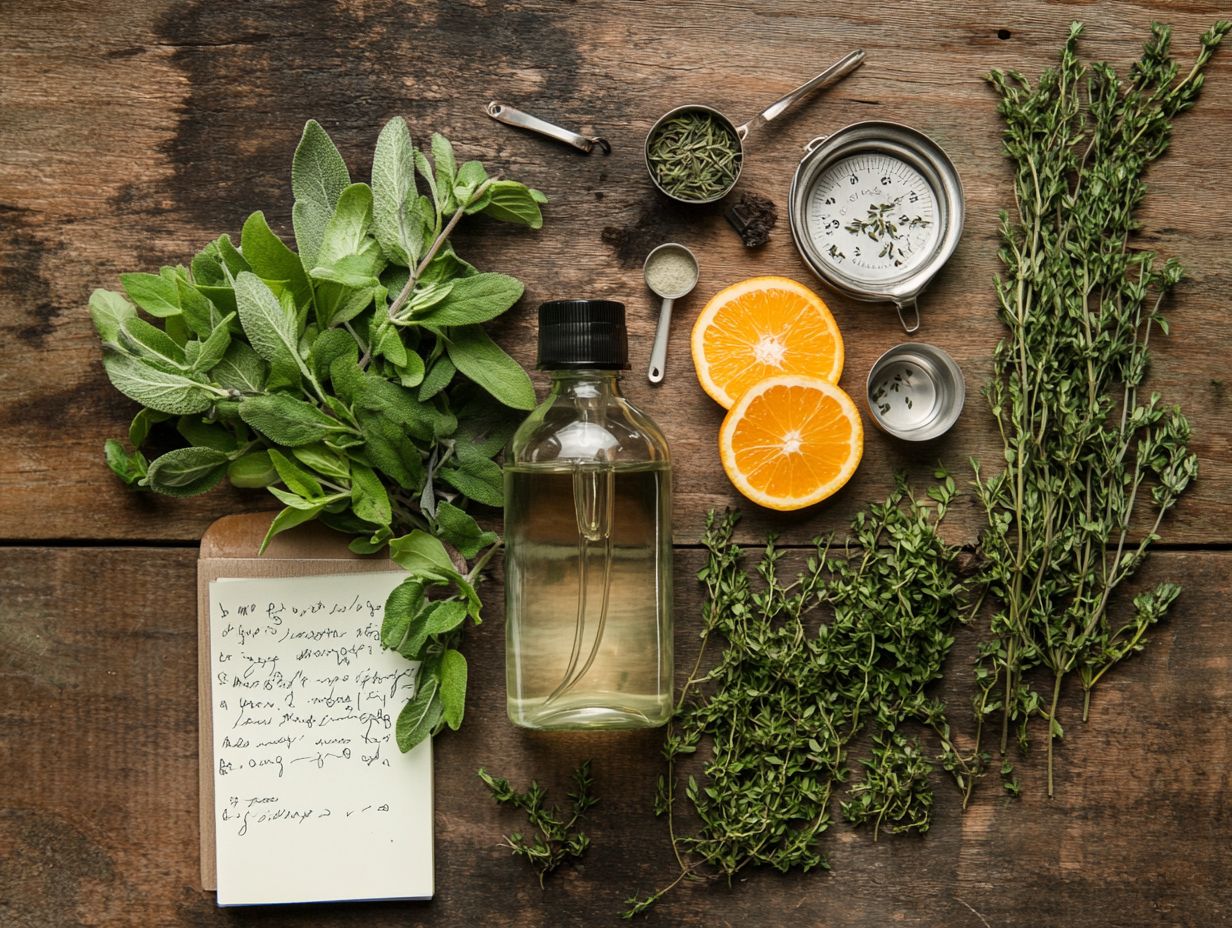
What are the benefits of using 5 effective homemade insect sprays?
Using five effective homemade insect sprays reduces your exposure to harmful chemicals. They are cost-effective and simple to make.
What ingredients are commonly used in homemade insect sprays?
Common ingredients include essential oils, vinegar, garlic, and cayenne pepper. These natural ingredients repel insects without harming the environment.
How do I make a basic homemade insect spray?
Mix equal parts of water and white vinegar in a spray bottle. Add a few drops of essential oils like peppermint or eucalyptus for extra effectiveness.
Are homemade insect sprays safe for pets and children?
Most homemade insect sprays are safe for pets and children. Always test a small area first and supervise when using the spray.
Can I use homemade insect sprays on any type of insect?
Homemade insect sprays work well on many insects, including mosquitoes, flies, ants, and roaches. However, they may be less effective against larger pests like rodents or spiders.
How often should I use homemade insect sprays?
Usage depends on the insect problem. Generally, spray once a day or every few days for best results. Increase frequency for severe problems.

